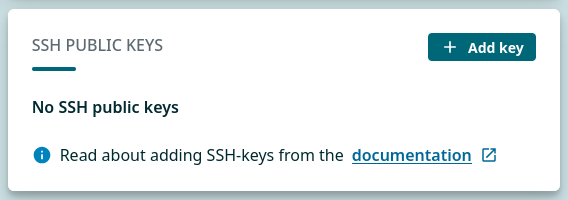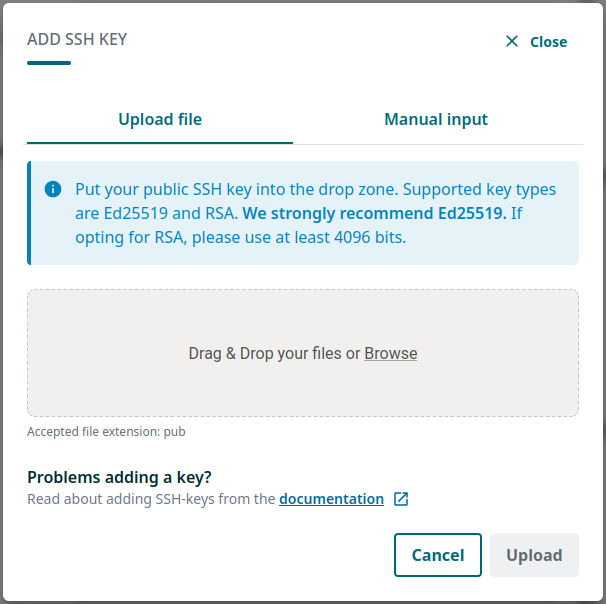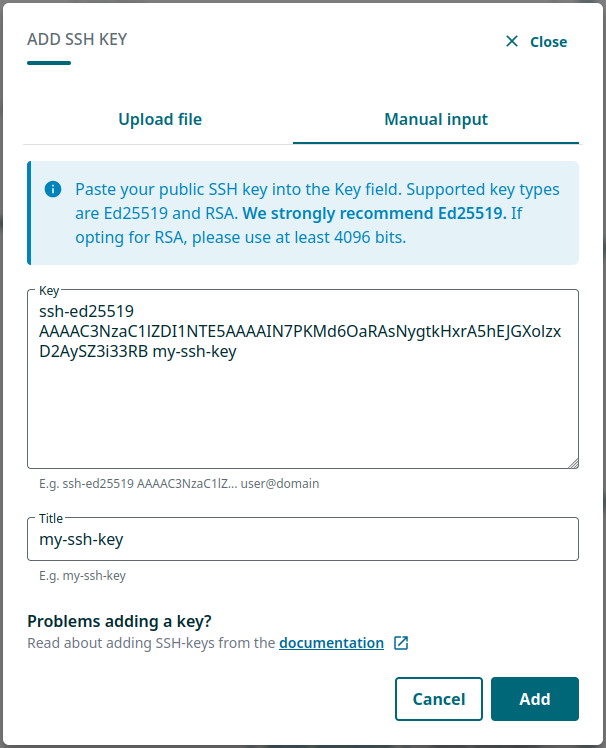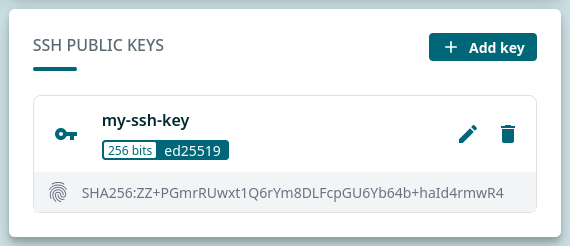Setting up SSH keys
SSH keys are required to connect to Puhti and Mahti over SSH
Since April 14th 2025, connecting to Puhti and Mahti over SSH only works
using SSH keys added in MyCSC. Password authentication and public keys
stored in users' personal ~/.ssh/authorized_keys file on the
supercomputer no longer works.
Read the detailed instructions on setting up and using SSH keys.
SSH keys provide more convenient and secure authentication. Setting them up is a two-step process, and is required to be able to connect to CSC supercomputers using an SSH client.
- Generate SSH keys on your local workstation.
- SSH keys are always generated in pairs consisting of one public key and one private key. Generate these keys on the device you intend to use to connect to CSC supercomputers. Never share the private key with anyone!
- Copy the public key from your workstation to MyCSC.
- For authenticating an SSH connection using a key pair, you need to copy
the public key to MyCSC. Do not copy the private key. Note that
copying the public key directly to CSC supercomputers using tools such as
ssh-copy-idwill not work.
- For authenticating an SSH connection using a key pair, you need to copy
the public key to MyCSC. Do not copy the private key. Note that
copying the public key directly to CSC supercomputers using tools such as
For more information about SSH keys, see:
Generating SSH keys
To find out how to generate SSH keys on your local workstation, see the system-specific instructions for:
- Unix-based systems (macOS and Linux)
- Windows systems
Warning
The private key should never be shared with anyone, not even with CSC staff! It should only be stored on the local workstation.
Also, never leave the passphrase empty when generating an SSH key pair! Please choose a secure passphrase. It should be at least 8 characters long and contain numbers, letters and special characters.
Copying public key to supercomputer
The only way to copy a public key to a supercomputer is through the MyCSC customer portal. Read the instructions below.
Adding public key in MyCSC
You can add your public key through the MyCSC customer portal by following these steps:
- Log in to MyCSC with your CSC or Haka/Virtu credentials.
- Select Profile from the left-hand navigation or the dropdown menu in the top-right corner.
-
Locate SSH PUBLIC KEYS section and select + Add key. As a security measure, you are asked to log in again if it has been a few minutes since you last logged into the portal.

-
Add your public key by either
- uploading the public key file in the Upload file tab, or
-
manually pasting its contents into the Key field in the Manual input tab. In this case, also add a Title for the key, e.g. "my-ssh-key".


-
Select Upload or Add.
-
You should now see your new key listed under SSH PUBLIC KEYS. Note that it might take up to one hour for your new key to become active. If it takes longer than that, please contact the CSC Service Desk.

Supported key types and formatting
Supported key types are Ed25519 and RSA 4096 through 16384. We strongly recommend Ed25519.
Your public key should consist of the SSH key type, the key sequence and an optional comment, all separated by single spaces. Make sure to add the whole SSH key on the same line and do not add other whitespace than normal space characters. If your key is improperly formatted, an error message is displayed. A key in the correct format looks like this:
Users can check their public keys on Puhti or Mahti using the commands:
# Check timestamp of file (time of previous sync)
ls -l /var/lib/acco/sshkeys/${USER}/${USER}.pub
# Check its contents (public keys)
cat /var/lib/acco/sshkeys/${USER}/${USER}.pub
If you have added multiple keys to MyCSC, they should all be visible in the
same ${USER}.pub file.